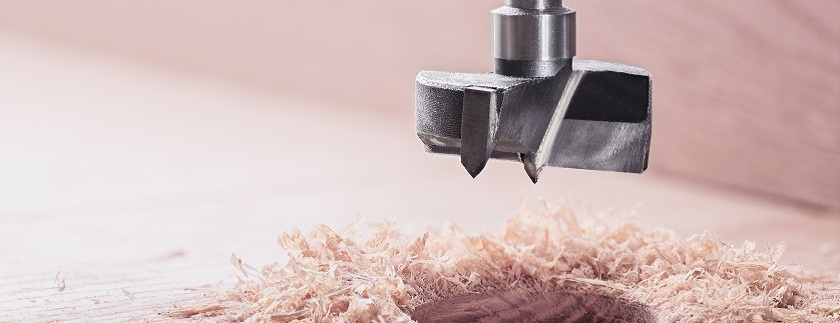When working with wood or metal, there are often times that you’ll need to drill holes with complete accuracy. Drill bits offer a solution, which can be fitted to a stationary pillar drill or a power drill. Here’s a guide to the different drill bits available and which to use for different jobs.
Flat Bits – also known as spade bits, these are efficient for drilling bigger holes in timber, but more prone to wander than other bits if used freehand. They come in a variety of sizes to achieve the size hole you’re after, often available as drill bit sets.
Auger Bits – also known as Lewis pattern auger bits, these are single twist bits with wide flightings and a solid central core. Auger bits are ideal for drilling fast, precise and clean holes in wood, for instance dowel holes or holes in beams or floor joists. The threaded tip pulls the bit through the wood which reduces effort and makes for efficient hole-making. The bits come in a range of sizes indicated by a M then number, the M represents ‘Metric’ and the number indicates their diameter (approximately), so a M10 would give you a 10mm hole.
Blacksmith Drill Bits – similar in design to Auger bits, these drill bits are suitable for drilling holes in steel, cast iron or non-ferrous metal. They are often manufactured from steel and use a hot roll-forged process which gives some break resistance.
Concrete and Masonry Drill Bits – These are specifically designed for drilling into concrete, brick and most masonry material. They are produced from alloy steep and have fast helix flutes designed specifically for rapid soil removal.
Cup Hinge Boring Bits – Also known as a Forstner bit. If you need to drill into a concealed hinge, this drill bit will do the job. The bit is guided by its rim and not a spiral or point, which is why it’s ideal for overlapping holes, awkward grain or angled drilling. For end grain holes, the sawtooth pattern is preferable. It is the ultimate bit for precision drilling and particularly with larger holes.
Holesaws – with bi-metal teeth, hole saws are used for drilling circular holes in wood, thin metals, brick, glass and masonry, as such they are also known as hole cutters. The threaded arbor (or pilot drill bit) keeps the piece central. They are used when you don’t need to cut up the core, which makes them preferential to flat bits for relatively large holes.
Twist Bits – Designed for metal (but suitable for timber too). The bits produce consistently clean, concentric and blur free holes. You should use a central punch to mark the hole centre before drilling, which will stop the bit wandering and use with cutting oil when using with metal.
Click here to view our entire range of drill bits, which also includes chuck keys, holders and chucks.



